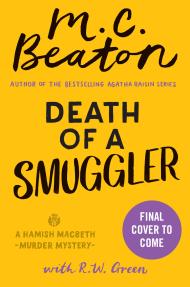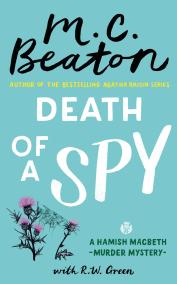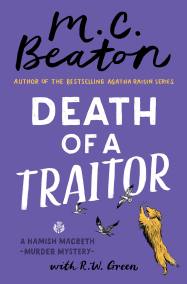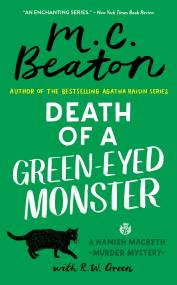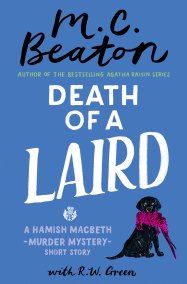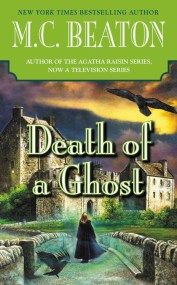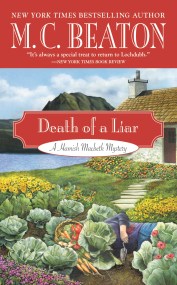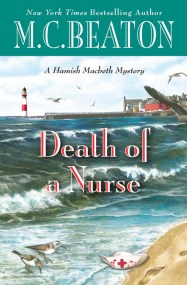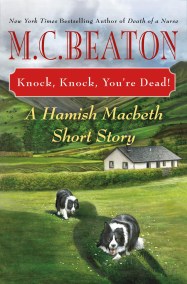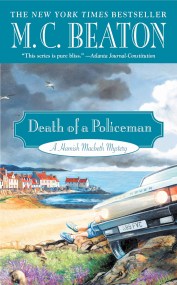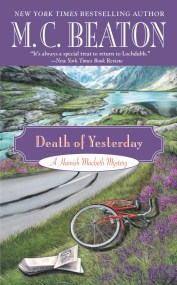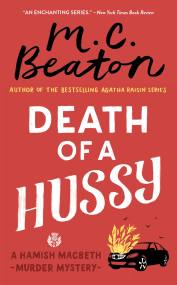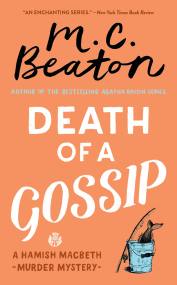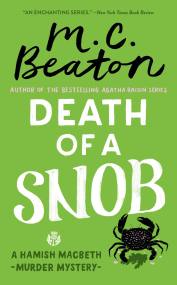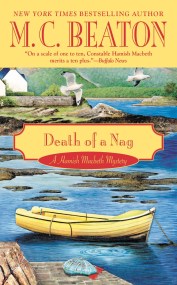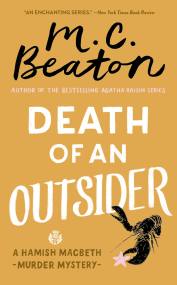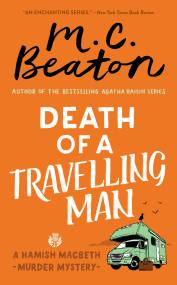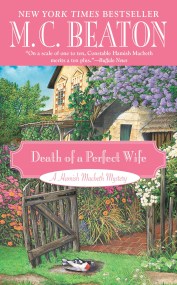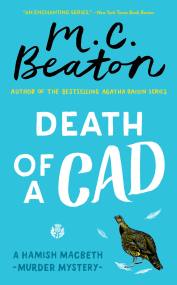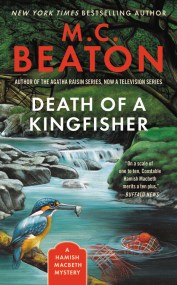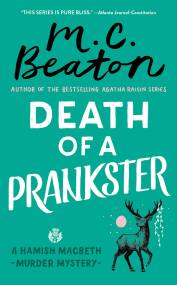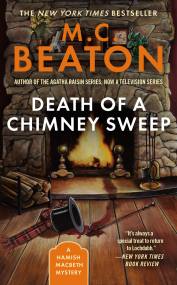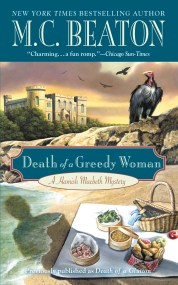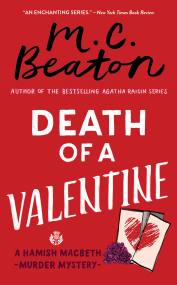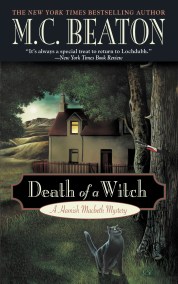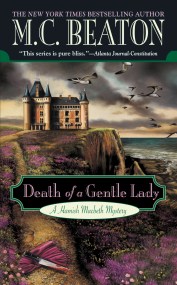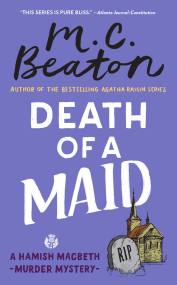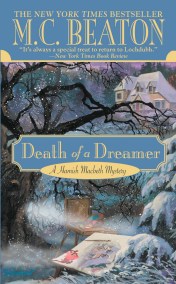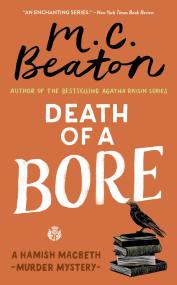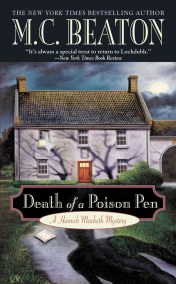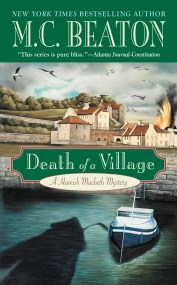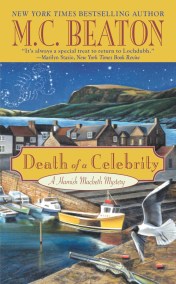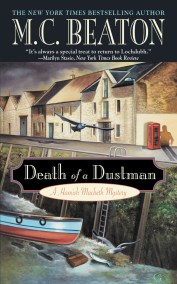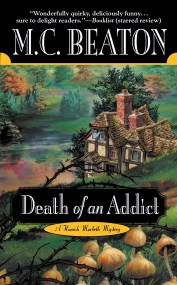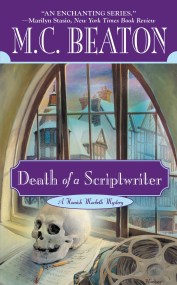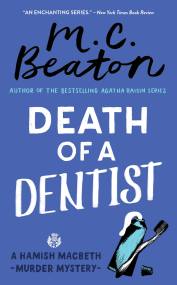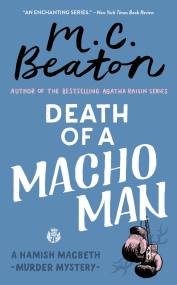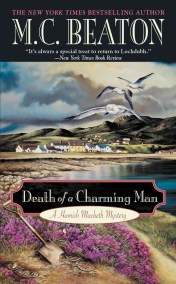
We have updated our Privacy Policy Please take a moment to review it. By continuing to use this site, you agree to the terms of our updated Privacy Policy.
Description
Paul first attended church in Lochdubh and told the minister, Mr. Wellington, that his sermons were boring. He then told tweedy Mrs. Wellington that she was too fat and should set a better example in these days of increasing obesity. Angela Brody was told her detective stories were pap for the masses and that she should write real literature instead. He accused Hamish of having dyed his fiery red hair. He told Jessie Currie–who compulsively repeats all the last words of her twin sister–that she needed psychiatric help.
"I speak as I find," he bragged. A refrain of "I could kill that man," could be heard from Lochdubh to Cnothan.
And someone did.
Now Hamish is faced with a bewildering array of suspects, this time without the services of his clumsy policeman, Charlie, who resigned from the force after one too many confrontations with Hamish's incompetent boss, Chief Inspector Blair. But can Hamish find the killer on his own?
What's Inside
CHAPTER ONE
***
***
Over a mammoth breakfast, Hamish said, “We can try to arrest him for a hate crime but we need proof. Oh, there’s the door. What now?”
He opened the door and the small figures of the Currie sisters scuttled in: spinster twins, dressed in identical camelhair coats with identical glasses and identical permed hair. Nessie shouted, “Arrest him!”
“Who?” asked Hamish.
“Thon Mr. English. Do you know what he said to Jessie?”
“Said to Jessie,” chorused her sister who always repeated the last line of anyone’s conversation, like Browning’s brave thrush trying to recapture that first fine careless rapture.
“Tell me.”
“He said she needed to go to a psychiatrist and get a mind of her own.”
“Of her own,” sighed Jessie.
“I cannae arrest him for that. Has he upset anyone else?”
“He told Mr. Wellington that his sermons were boring, but it was what he said to Mrs. Wellington!”
Hamish ignored the Greek chorus that was her sister.
“He said she was fat and should go on a diet because she was a bad example.”
“Gets worse,” commented Hamish. “Any more?”
“Mr. Maclean.”
“Archie? What did he say?”
“He laughed in his face and said he looked shrink-wrapped in a tweed suit.”
Archie the fisherman’s wife boiled all his clothes with the result that they were always too short and too tight.
“Don’t worry, ladies,” said Hamish. “I’ll go back to see him as soon as I finish eating.”
It wasn’t only this Paul English who should watch what he said, thought Hamish, as Nessie’s voice from outside came back to him. “Got to eat, eh? That’s why they call them pigs.”
“Well, Charlie,” said Hamish, “we’d better pull him in. We can charge him with a hate crime because of Mr. Patel’s statement and that can be enough to go with.
“I s’pose,” said Charlie, looking out of the window. “Mind you, it’s the grand day and the games are on at Drumnadrochit. We could always arrest him in the evening.”
“Aye, the silly sod isn’t worth wasting the day on. What brought him up here?”
“He’s been heard to say, quality of life.”
“Another drunk, probably. They aye hae this dream o’ Bonnie Prince Charlie and Mel Gibson’s view on history and the only romance they ever find is at the bottom of a whisky glass. Next winter should see him off. Nothing like a highland winter for bringing a bad case of the rehabs.”
Hamish insisted on washing up and told Charlie to go outside and stay there until he had finished. Sometimes it seemed as if clumsy Charlie could break dishes by just looking at them.
When he rejoined Charlie, he noticed his dogs in the back. He felt a tinge of sadness. He hadn’t heard from Elspeth Grant although he often saw her reading the news on television from Glasgow. They had spent a wonderful weekend together but nothing had come of it although at first he had phoned almost every day. She always said she was too busy to see him, and at last, he had given up calling.
“What we ought to do,” said Charlie as they drove out of Lochdubh and up over the hills, “is introduce thon scunner, Blair, to Paul English and see what happens.”
Hamish laughed. “You mean like light the touch paper and retire? Great idea. I’m still worried about Blair. I know he’s capable of murder and he hates me.” Detective Chief Inspector Blair was the bane of Hamish’s life. And Hamish knew Blair had caused the death the previous year of someone who was a threat to him.
***
Blair climbed the stairs to speak to his boss, Superintendent Daviot. Helen, the secretary, was just replacing the phone. “Macbeth again,” she said.
The detective’s bloodshot eyes shone with malice. “What’s he been up to?”
“There’s a newcomer over at Cnothan called Mr. English who claims Macbeth and the other policeman insulted him and the policeman also made a pass at him.”
“I’d better go and see him,” crowed Blair. “But I’ll just be having a wee word with the boss first.”
***
Blair had been warned to be careful about mentioning homosexuality in these fragile days, but he regarded homosexuals with that sort of deep contempt that only a man whose sexuality might be in question could feel.
He had decided to adopt a sort of hail-fellow-well-met attitude and so he shook hands with Paul and said with a
hortle, “Got a pass made at you by a shirtlifter, hey?”
“What are you talking about?” demanded Paul.
“Macbeth’s sidekick. Big fairy called Charlie.” “I shall have to report your politically incorrect remarks to your superior officers,” said Paul, beginning to enjoy himself.
“Who do you think you’re dealing with, laddie? I amn’t some teuchter like Macbeth. But I’ll admit he needs taking down and so I’ll get a statement from you.” Blair sat down without being asked.
Paul began to feel a prickling of unease. Who were this man’s superiors going to believe? Himself ? Or one of their own, namely Hamish Macbeth.
“I would prefer not to discuss the matter,” said Paul. “No charges.”
“Whit?” demanded the enraged Blair. “I come out here to the back o’ beyond and then you decide you don’t want to speak? Get this, laddie, I will be charging you with wasting police time if you don’t get on with it and make a statement.”
Paul looked at Blair’s face, which was a network of broken veins. “You drink too much,” he said.
“What’s that got to dae wi’ Charlie making a pass at ye?”
“As you have the face of a heavy drinker, I want to be sure I am not wasting my time making a statement. You might leave here and go to the nearest bar and forget about the whole thing.”
“Keep yer damn personal remarks to yourself,” shouted Blair. “How did Charlie Carter make a pass at ye?”
“He picked me up and laid hands on me.”
“On yer bum?”
“He patted me on the head.”
“In retaliation to what?”
“I simply asked if he and the other officer were a pair.”
“Michty me. And you expect me to make a case out o’ that?”
“Oh, do your duty, man.” Paul sniffed the air. “You’ve been drinking already. What is the name of your superior officer?”
He took a step back as Blair stood up and advanced on him. “See here,” said Blair. “Any mair reports agin the police and it’ll be the end of you.”
“Are you threatening me?”
“You report me, you scunner, and I will hae you for wasting police time.”
The door of Paul’s living room opened and Granny Dinwiddy walked in. “Will you be wanting coffee or tea?” she asked.
“No, but make sure you make a good job of cleaning the kitchen,” snapped Paul.
When the woman had left, Blair said, “Your maid’s too damn auld tae be a skivvy. Do you at least pay her the minimum wage?”
“That is my business,” said Paul, becoming flustered.
He tried to bar the way but Blair nipped round him and into the kitchen where he could be heard asking Granny Dinwiddy how much she was being paid. Now, Granny Dinwiddy was only being paid five pounds an hour andshe knew it should be seven pounds, fifteen pence, but she was expert at thieving stuff from the kitchen so that Paul would never notice: a teabag or two, sugar cubes, siphon off a little bit of whisky, cuts of meat shaved off what Paul got from the butcher, and occasionally stealing a note out of his wallet when he had fallen asleep. So to Blair’s great disappointment, she said she was paid the minimum wage.
Paul overheard her and sighed with relief, but, he reflected, because of her age, people would think him a sort of slave driver, so as soon as Blair had stomped his way out, he told Granny Dinwiddy that her services were no longer needed.
“Yes, they are, or I will tell them what you are actually paying me,” she protested.
“I give you cash. You’ve no proof. Who are they going to believe? Me, or a senile old fool like you?”
She fished in her apron pocket and held up a small tape recorder. “They’ll believe this.”
He made to snatch it out of her hand but she seized a marble rolling pin and struck him on the nose. He reeled back, blood running down his face. “I’ll sue you,” he yelled. “I’m off to the doctor. Don’t be here when I get back.”
***
Hamish was leaning on the seawall that evening, looking dreamily at the loch, when he heard himself being hailed by Angela Brodie, the doctor’s wife.
“Someone gave Paul English a nasty dunt on the nose,” she said. “He claims he walked into a cupboard.”
“He’s insulted everyone I can think of,” said Hamish. “One of them was bound to crack. Has he insulted you?”
“Oh, yes, he came round with a book for me to sign. He said, ‘Put down: To Paul, with apologies for writing this brainless pap.’ So I wrote ‘To Brainless Paul’ and he cursed and yelled. There must be something really badly wrong with him. Do you think he’s one of those people who are too frightened to commit suicide so they try to goad someone into killing them?”
“Mr. Smug? No. Not for a moment. Actually, I am taking a run up there. I’m sure he’s underpaying Granny Dinwiddy. What on earth is the woman’s proper name?”
“It’s Maggie Dinwiddy and she’s as old as Methuselah.”
***
But when Hamish arrived at the cottage, Paul said that Mrs. Dinwiddy had gone home. His nose was taped and bandaged and he sounded like Kipling’s elephant. “Ah fyredd ’er,” he said.
“Fired her, did you? That means you were probably paying her cheap,” said Hamish. “I’ll go and ask her.”
Paul had pale-green eyes like sea-washed glass. A flicker of malice shot through them. “Good ’uck.”
Hamish drove down to the waterfront to a small cottage where he knew Maggie Dinwiddy lived with her daughter.
But her daughter, a widow called Holly Bates, said her mother hadn’t come home. Hamish began to worry. Paul had looked so maliciously smug. Had he done something to her?
***
After two days, Hamish finally reported Maggie Dinwiddy as a missing person and said she may have come to harm. Paul seemed amused at all the police questions until it began to dawn on that brain of his, which was not one bit as intelligent as he thought it was, that he was suspected of murder. He reluctantly admitted he had paid for Maggie to go on a cruise. He supplied the name of the travel agency and the shipping line.
Maggie was contacted and said that—God bless the man—he had paid for this holiday out of the goodness of his heart, and that was all they could get out of her. Only Hamish guessed that Paul had been blackmailed by the cunning old fright.
All his smugness and confidence restored, Paul beamed on the police. That was until Detective Chief Inspector Blair charged him with perverting the course of justice and had him driven to police headquarters and dumped in a cell. Only after twenty-four miserable hours was he able to hire a lawyer who promptly got him out on bail, said he would defend him in court, then mentioned his fee and Paul, ever the cheapskate, spluttered that he would defend himself
Hamish felt uneasy. There was something nasty about the whole thing. Paul had probably paid Maggie in cash so it would be only his word against hers. He decided to pay another visit to her daughter, Holly. Why hadn’t Holly said anything about the cruise? Surely her mother would have told her.
But Holly stoutly said that her mother had said nothing about a cruise and all her clothes were in the wardrobe so what else was she supposed to think? Hamish asked to see the clothes and sure enough, the admittedly meagre wardrobe seemed to be intact. The phone rang and Holly went through to the living room to answer it. Hamish began to search through the pockets of the clothes, hoping for some clue, until his hands closed on the little tape recorder. He heard Holly coming back and put the recorder in his own pocket.
He was to curse himself afterwards and wish that he had simply given Holly a receipt for it.
Back at the police station, he was about to switch it on when Charlie came lumbering in, tripped over Lugs, and crashed down on the table, sending cups and plates flying.
Hamish helped him up and together they cleaned up the mess. “Now,” said Hamish, “sit yourself down, take a deep breath, and tell me what’s bothering you.”
Charlie carried forward a stout oak chair, especially kept for him, and eased his bulk into it.
“I’m not enjoying being a policeman any mair, Hamish.”
“Has anything happened?”
“It’s thon scunner, Blair. Yesterday, you mind, you sent me back to Maggie’s daughter but Blair was there and he was making her cry, shouting and yelling. So I picked him up and put him outside of the front door and locked it. So I’m to be charged with laying hands on a superior officer.”
“It’s all right, Charlie. I’ll go and see Holly Bates. She’ll say Blair frightened her and she’ll stand up for you.”
“No, she won’t, Hamish.”
“Whit?”
“Aye. I thought o’ that and went back when the coast was clear and she point-blank refused to help me. Said she’d take Blair to court for police harassment and get money out o’ the police to shut her up.”
“There’s something awfy fishy about thon pair. Wait! I took a tape recorder out o’ one o’ Maggie’s pockets. She had left all her clothes behind, which means she not only got a cruise out o’ Paul but new clothes as well. Help yourself to a dram and pour me one and we’ll hae a listen.”
“That’s not even the minimum wage,” came Maggie’s voice.
Paul: “Like it or lump it.”
Maggie: “I need the money and that’s a fact.”
“Is that all?” asked Charlie.
“Maybe there’s something later on,” said Hamish. “Oh, here we are!”
Maggie’s jeering voice: “Get on all right at the doctor?”
“Why are you still here?”
Maggie: “I thocht we might come to an agreement afore I go to the police.”
Paul: “What agreement, you old hag. No, get back. I’ll listen.”
Maggie: “I want new clothes and a two-week cruise to the Norwegian fjords and I want it now. Take me to the travel agency in Strathbane now or off I go to the polis. Or I’ll maybe break yer heid the next time.”
“I’ll take this to Blair,” said Hamish. “This gets him off the hook. What a pair! Oh, crivens. I just lifted this recorder. Now I have to go back and pretend to find it. And I’ll bet she asks for a search warrant.”
But to Hamish’s relief, Holly smiled and let him look through the clothes again, but she let out a sharp exclamation when he held out the recorder and said he would give her a receipt for it.
“That’s private property,” she yelled. But Hamish merely smiled as he wrote out a receipt.
***
On board the Norwegian cruise ship, Maggie received a frantic call from her daughter about the tape recorder. Her companion on deck, an equally elderly lady, listened as Maggie shouted, “Get rid of him somehow.”
“What is it, honey?” she asked when Maggie rang off.
“Oh, jist family,” said Maggie.
“Oh, aren’t they always just such a problem, honey,” said her American companion, old Mrs. Merriweather. “Why, I do but mind . . .”
Maggie tuned her out. Oh, to be able to disappear! But as Mrs. Merriweather droned on about how too terribly sad it was to outlive your family, punctuating each sentence with a wave of her diamond-encrusted fingers, Maggie began to listen and look. People never really look at the very old, she thought. I mean, the number of times on this cruise the captain’s called me by her name must be about fifty.
***
“She’s what?” shouted Hamish two days later.
Holly’s voice choked with sobs came over the line. “She jumped overboard and it’s because I told her about the police harassment.”
While she sobbed and accused, Hamish thought of crocodile tears and when he estimated she had wept a whole set of luggage, he simply put the phone down.
He whistled to his pets and drove up to the Tommel Castle Hotel to call on his sidekick in his flat in the basement. Charlie listened to Hamish’s complaint and said, “You know what’s been bothering me. If Maggie was blackmailing Paul, well, look at it this way, I’ve a feeling she and that daughter of hers must have done something like it before. There’s another thing that’s been bothering me. I don’t think cheating auld Granny out o’ the minimum wage was enough for a new wardrobe of clothes and a cruise. I think she and her daughter had something else on him.”
“I wish we could get a search warrant.”
“Maybe we could do it like this,” said Charlie. “They’re bound to find the body—well, let’s hope they find the body. It’ll be shipped back and there’ll be a funeral. You go and I’ll break in and have a wee keek.”
Hamish looked at him with affection. Charlie was a policeman after his own heart.
Praise
—Booklist
—Publisher's Weekly









